|
School Board Gets Schooled about the Brown Act
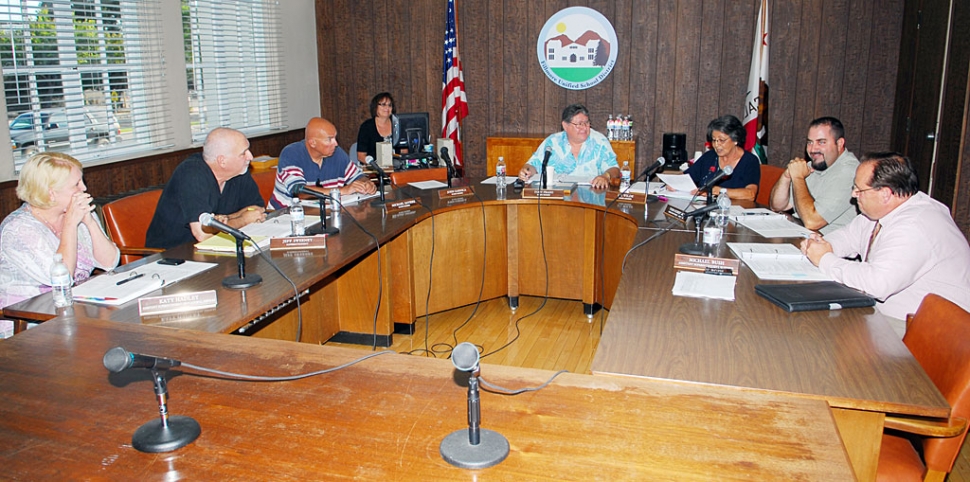 Several topics were discussed at Tuesday night’s school board meeting. One hot topic was Brown Act violation(s) by the school board. See the District Attorney's letter to Board President Prado (pages 1-5) below. By Kimberly Rivers — Wednesday, August 4th, 2010
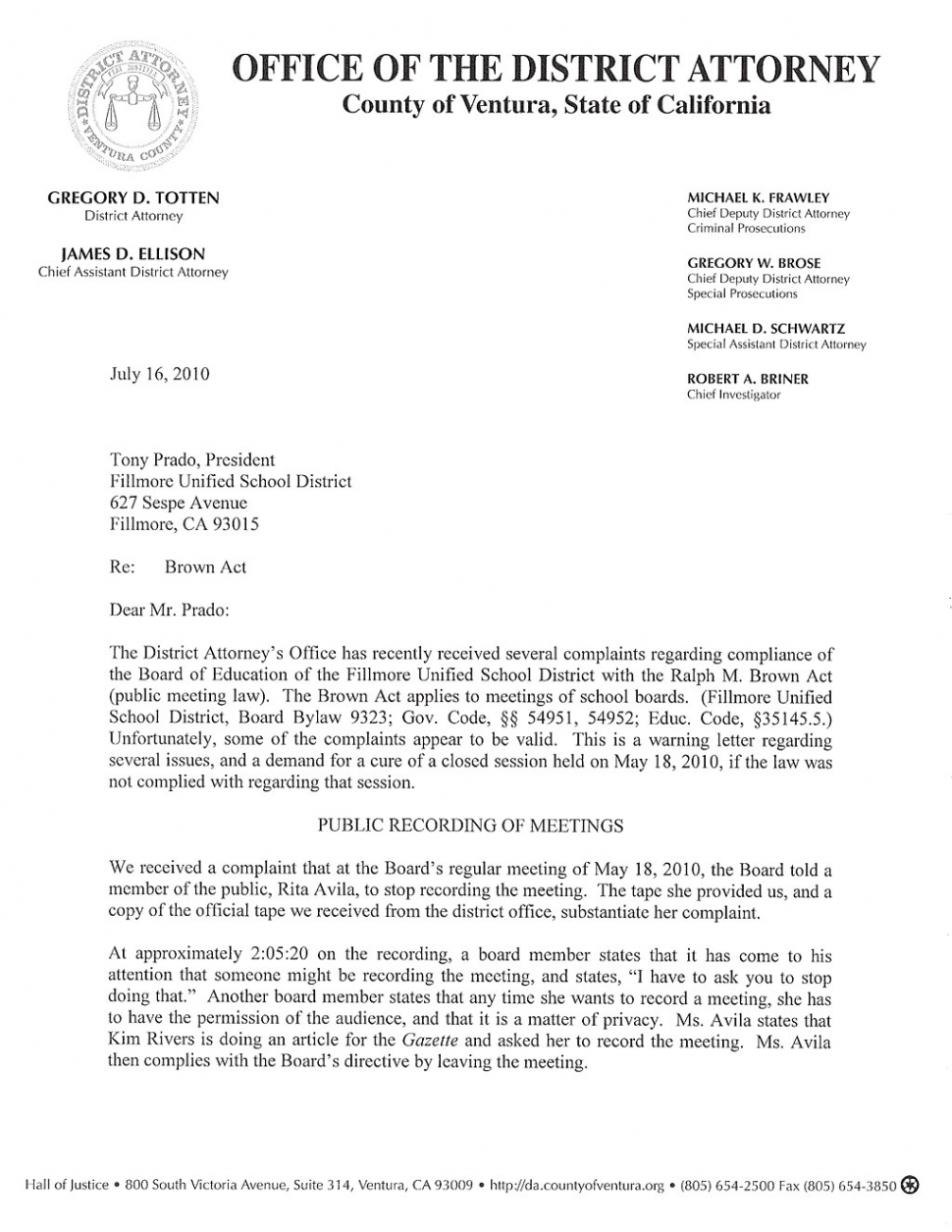 Brown Act violations letter page 1. 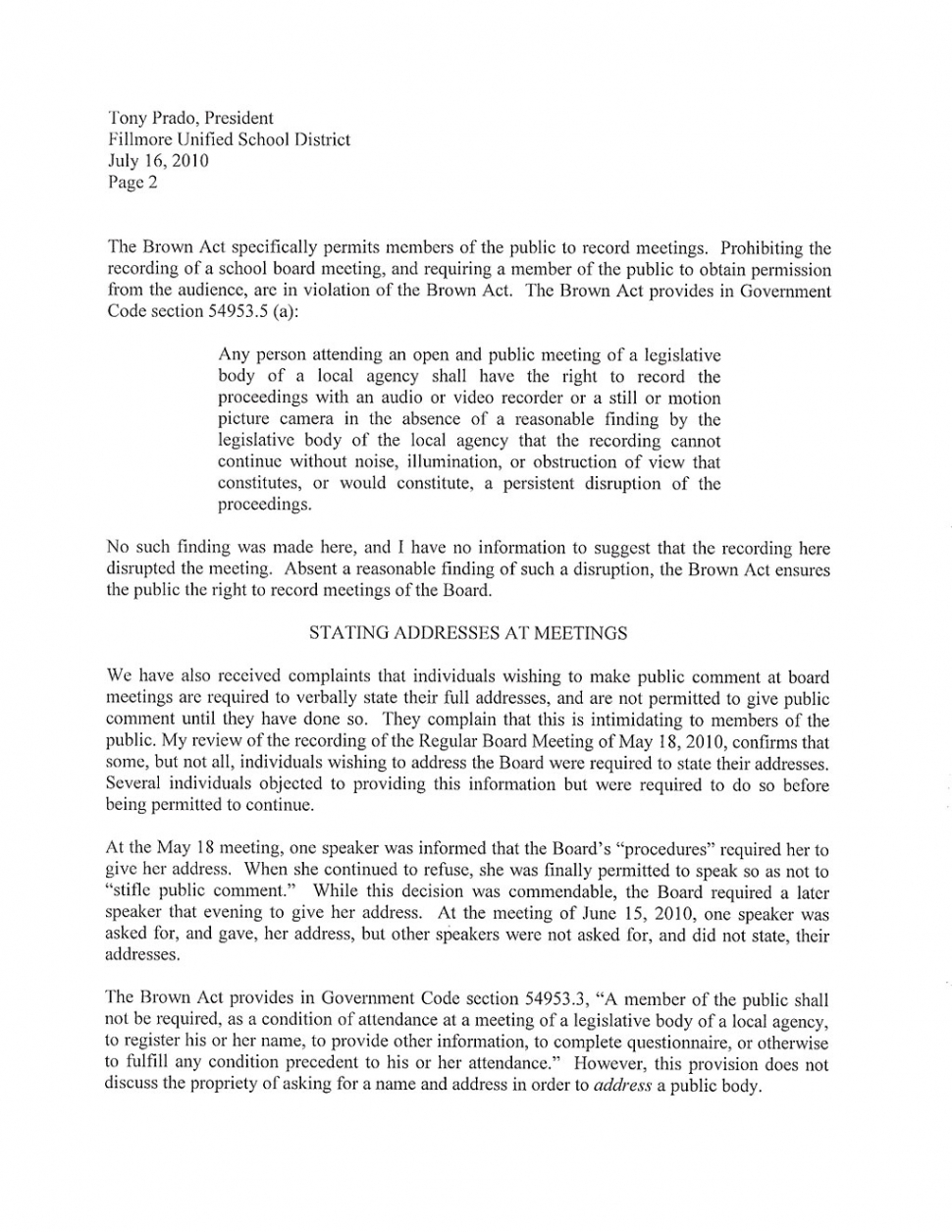 Brown Act violations letter page 2. 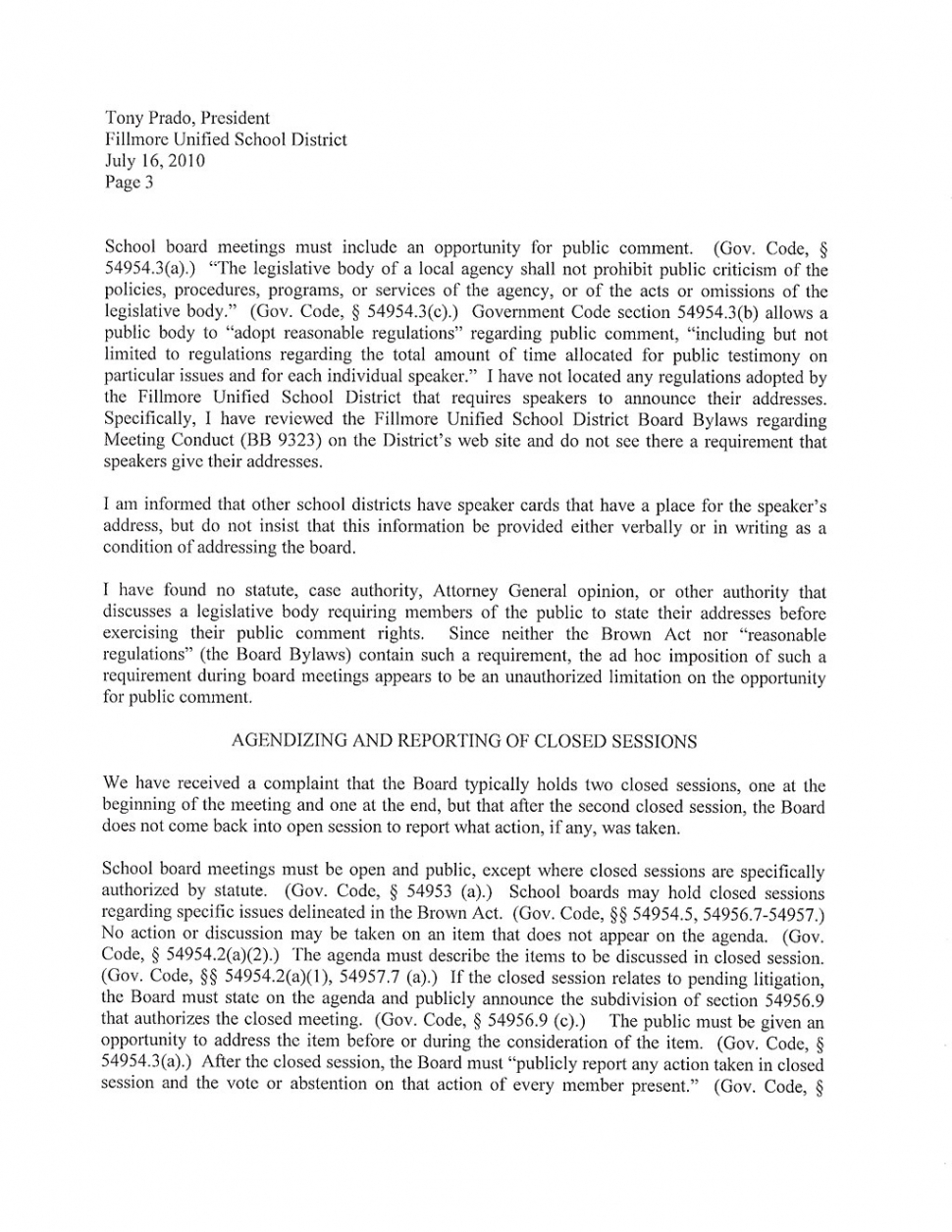 Brown Act violations letter page 3. 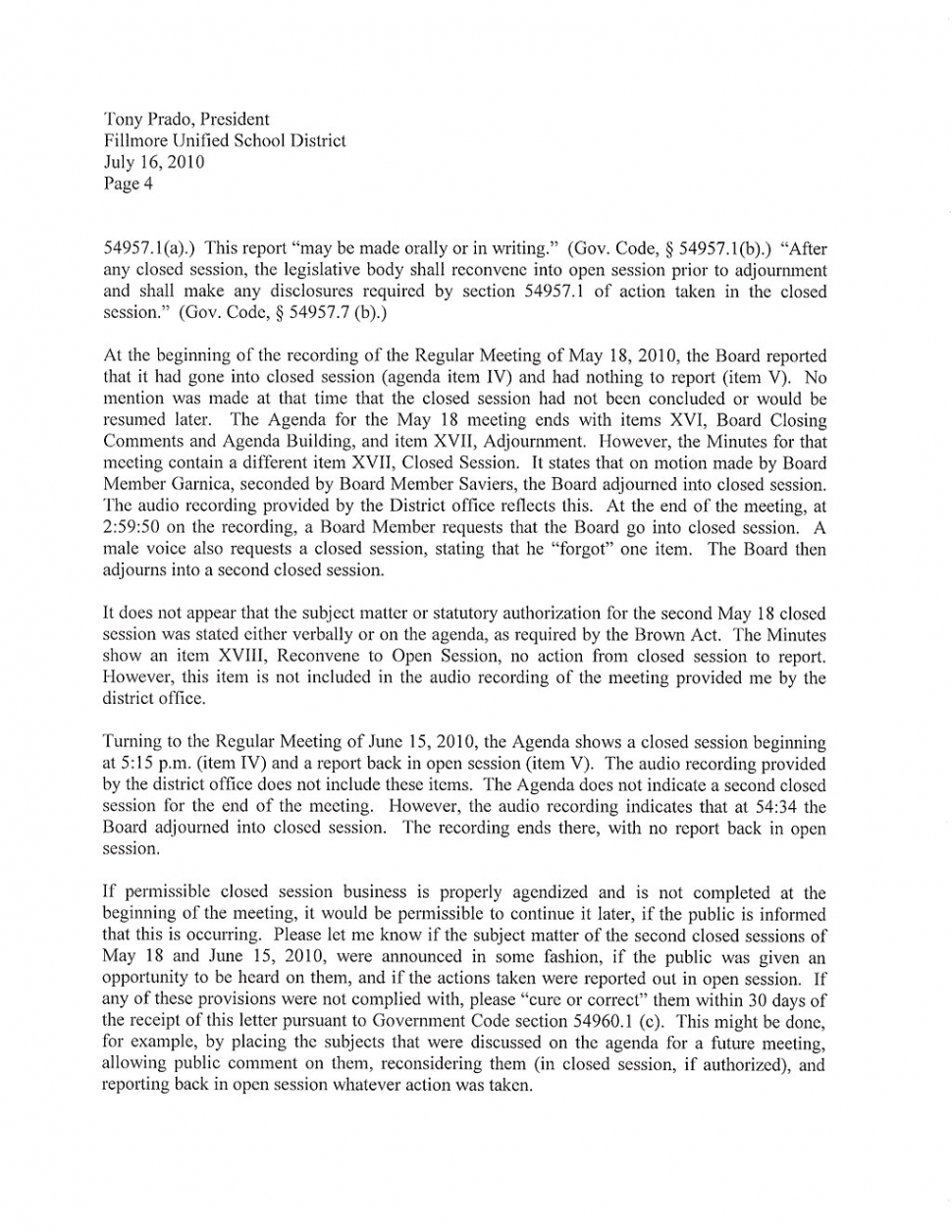 Brown Act violations letter page 4. 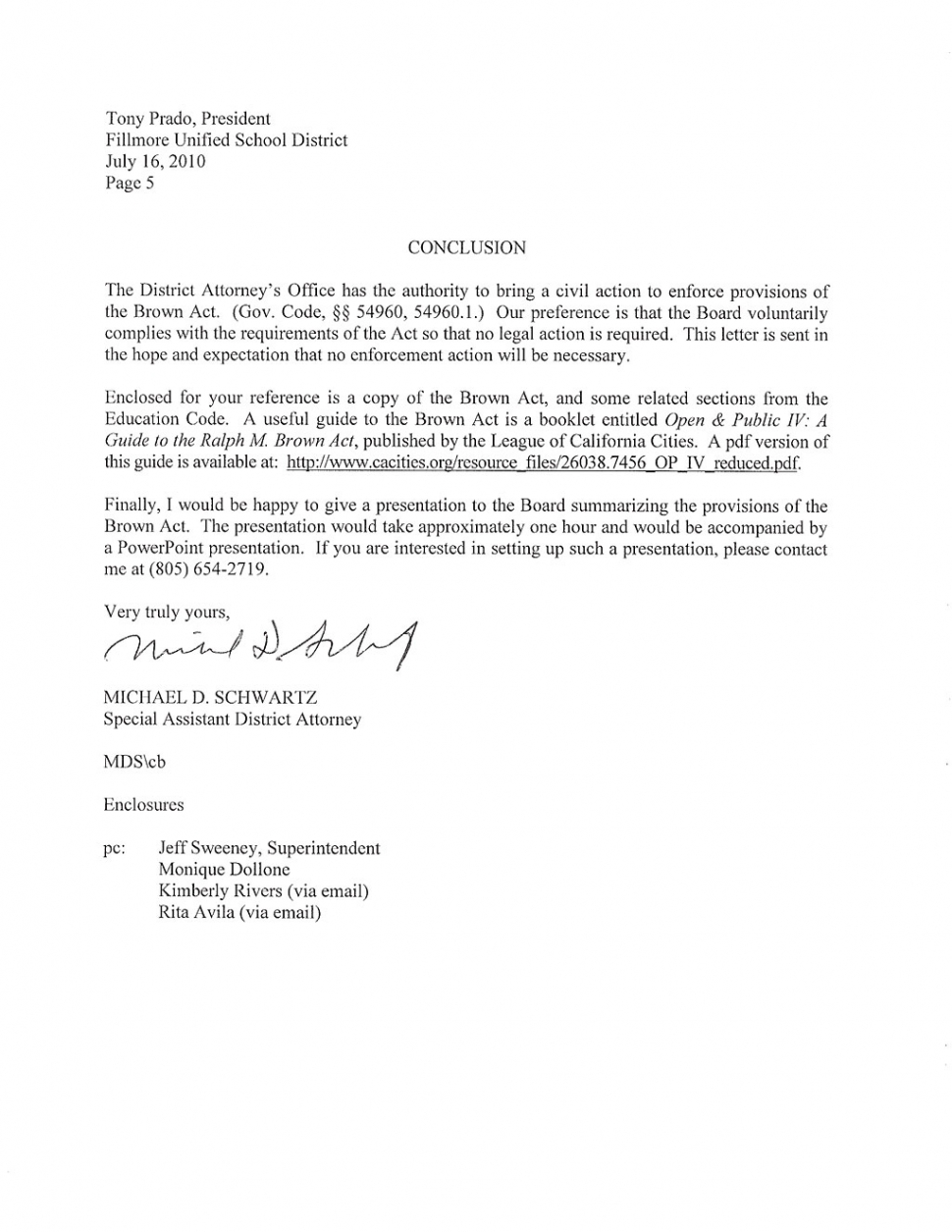 Brown Act violations letter page 5. At it’s Tuesday, August 3rd regular meeting the Fillmore School Board of Trustees conducted a relatively brief meeting with little public attendance. Board members present were Board President Tony Prado, Board Clerk Liz Wilde and Board Member Mike Saviers. Board business consisted of approving several ‘action’ items, including the approval of two new job descriptions. These positions represent a consolidation of other positions related to services for migrant and ESL (English as a Second Language) students. These positions will act as liaisons to parents of English learner students, and will work with principals and staff to fine tune the curriculum to meet the needs of the migrant and Spanish speaking population at the schools. According to data at the California Department of Education (CDE) (2008-2009 school year) this will represent about 1,395 students. Superintendent Jeff Sweeney announced the new ‘theme’ for this school year; ”Who’s First?” Last year it was The Power of One. This year’s program will be used to recognize faculty and staff who “put students first” and go “above and beyond” in doing so. In addition to reminding us about the State budget woes and their affect on the local District budget, Assistant Superintendent Mike Bush reported to the Board regarding a $50,000 grant received for a “Mommy and Me” infant to toddler program supported by First 5 of California. This program will provide a preschool program for children led by licensed pre-school teachers as well as classes focused on literacy, health and nutrition for parents and caregivers. The intent of the program is to get young children “school ready”. The program will have classes in Piru and Fillmore. The start date of the program is not yet known; interested parents and caregivers can contact the District for more information. Discussion and time was spent presenting various facilities issues. Both previous complaints filed regarding substandard facility issues, as well as improvements and new construction that has taken place over the summer. The new campus for Sierra High School is not quite complete but according to Board Member Liz Wilde is looking wonderful. The school will be open for students on the first day of school, with finishing touches still going on. Sweeney indicated that once complete a grand opening will be planned for the community to come and view the new campus. Prado read a statement regarding complaints made against the Board regarding various Brown Act violations. His statement was brief and indicated that they were fully cooperating with the District Attorney and that the Board was in full compliance. The Gazette has obtained a letter dated July 16, 2010, from Special Assistant District Attorney Michael Schwartz addressed to Prado. The letter states that according to complaints made and evidence corroborating them; the School Board was in violation of the Brown Act. Schwartz notes that the Board is required to allow members of the public to record all parts of a public meeting, so long as it does not disrupt the proceedings. Schwartz finds that on May 18th, when Prado asked Fillmore resident Rita Avila to cease recording he was acting in violation of state law. The letter goes on to state that requiring a person who is speaking during public comment to provide their address is an “unauthorized limitation on the opportunity for public comment”. This violation took place on May 18, 2010 as well but at that meeting Board Vice President Virginia De La Piedra actually stated that she had been on the Board for 14 years and they had always asked for individuals addresses. It would appear that the Board has been in violation of state law for 14 years. The letter from Schwartz also indicates possible violations regarding the Board’s conduct around holding closed sessions. The letter states “It does not appear that the subject matter or statutory authorization for the second May 18 closed session was stated either verbally or on the agenda, as required by the Brown Act”. Schwartz goes on to indicate a similar apparent violation at the June 15 Board meeting. The letter explains that if closed session business was not completed prior to a public meeting, that the Board may reconvene into closed session so long as they inform the public of this. But that the Board may not convene into closed session on an item that was not on the agenda, without stating the code that allows them to do so. Schwartz asks Prado to notify him if the public was somehow informed of the subject matter, actions taken and that the public was given opportunity to be heard on the items discussed in closed session following the May 18 and June 15 Board meetings. Schwartz does indicate that if not, the Board has 30 days to “cure or correct” this by “ placing the subjects that were discussed on the agenda for a future meeting, allowing public comment on them, reconsidering them (in closed session, if authorized) and reporting back in open session whatever action was taken.” The letter concludes by reminding the Board that the District Attorney has authority to “bring civil action to enforce provisions of the Brown Act” but prefers that the Board voluntarily comply. A copy of the Brown Act was included as well as an offer by Schwartz to come and do a one-hour presentation to the Board regarding the provisions of the Brown Act. Prado made no comment about having Schwartz do such a presentation. At the June 15th Board meeting in addition to possible violations of state law taking place, several school plans were approved. These school plans were created, reviewed and approved by each schools Site Council. School plans should be made publicly available, and are required for schools in PI (Program Improvement) status. According to the CDE all of the elementary schools as well as the middle school are currently in PI status. The CDE website states “A Title I school will be identified for PI when, for each of two consecutive years, the Title I school does not make AYP in the same content area (English-language arts or mathematics) school wide or for any numerically significant subgroup, or on the same indicator (Academic Performance Index [API] or high school graduation rate) school wide.” While the test scores from last school year are not yet available (they are expected within the next 30 days) it is expected that the schools in PI last year, will be in PI again this year. There continues to be little if no discussion from Board members regarding the state of the schools and what the district is doing to improve them. Concerned parents and community members can contact their principals to request a copy of the school plan and attend school site council and school board meetings to find out about what is being done to improve the schools. |
